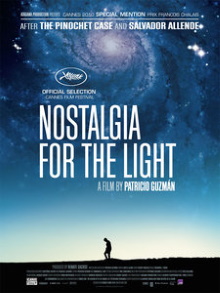My wife likes to be forewarned before watching any films that might be particularly dense or difficult to parse and a documentary about Chile’s political history seems to qualify. Yet the first one third of this hour and a half film seemingly has nothing at all to do with politics as it discusses the country’s love for astronomy and how the dryness of the Atacama Desert makes it one of the best places in the world to observe the stars. But the film does eventually swing around to the massacred victims of Augusto Pinochet’s dictatorship and so we see filmmaker Patricio Guzmán genius in linking these seeming unrelated topics. To be fair this style of documentary is too light on the facts for my tastes as it aims instead to make an emotional impact but I must admit it is critically acclaimed for good reason.
Filmmaker Patricio Guzmán inserts himself in this documentary as he recalls his own childhood love for astronomy and explains how the dry air and clear skies of the desert make the stars shine brightly at night. Not far from the observatories are also archaeologists who work on uncovering the carvings, crafted items and even mummified remains of pre-Columbian natives. As he explains both professions are engaged in looking back in time to explore the past. Yet he decries how Chile as a nation refuses to examine the recent past of the abuses of the Pinochet regime. He shows the Chacabudo concentration camp that is also in the Atacama Desert, being an old mining town repurposed by the regime to house political prisoners. He interviews a former prisoner who was part of a group of amateur astronomers. Then he shows the women who continue to comb the desert for the remains of their loved ones as the regime had disposed of the corpses of executed prisoners by dumping them in the desert or in the sea to prevent anyone from ever recovering evidence of their crimes.
This documentary is so highly regarded that I believe it is now considered one of the canons of Chilean cinema. Guzmán certainly approaches a difficult, painful topic from an oblique, artistic angle and there is a powerful poetic sensibility in linking astronomy, archaeology and the study of recent Chilean history together. It’s all part of looking into the past and remembering where we all came from. He even interviews an astrophysicist who points out the calcium in bones were formed in depths of stars and shows how going through the remains of the concentration camp is like uncovering ancient artefacts of the past. It’s all very emotionally affecting but the film is light on conveying factual information. All of the interviews shown favor artistic turns of phrases rather than exposition. There’s no attempt to educate viewers on how long Pinochet controlled Chile and what the regime actually did. It presumes that viewers should know enough at least some of this already but this is asking for an emotional reaction out of people who may not actually have a clear idea of what happened.
The images here are stark and austerely beautiful with plenty of still images of stars and galaxies. Similarly no one can unmoved by the images of the simple carvings from a thousand years ago or the mummified remains of ancient humans. But the film only asks of you to contemplate the images in silent awe. We are never told what all those astronomical images are actually of and no information is given on who those pre-Columbian peoples were. The same goes for the victims of the Pinochet regime. Their relatives agonize on camera about their loss but we have no idea why they were targeted. Again I get what the director is going for but there’s too little context on which to hang a strong emotional response.
Overall I still liked this even if I would prefer a documentary that provided more information. I find it revealing that the film berates Chilean society in general about being reluctant to look too closely into the evils of the Pinochet regime and yet it shies away from making accusations as to which parties specifically are impeding investigations. It’s fine for being the director’s personal impassioned plea for the world to pay greater effort and attention to the as yet unrectified wrongdoing in Chile but this is just the barest starting point.
